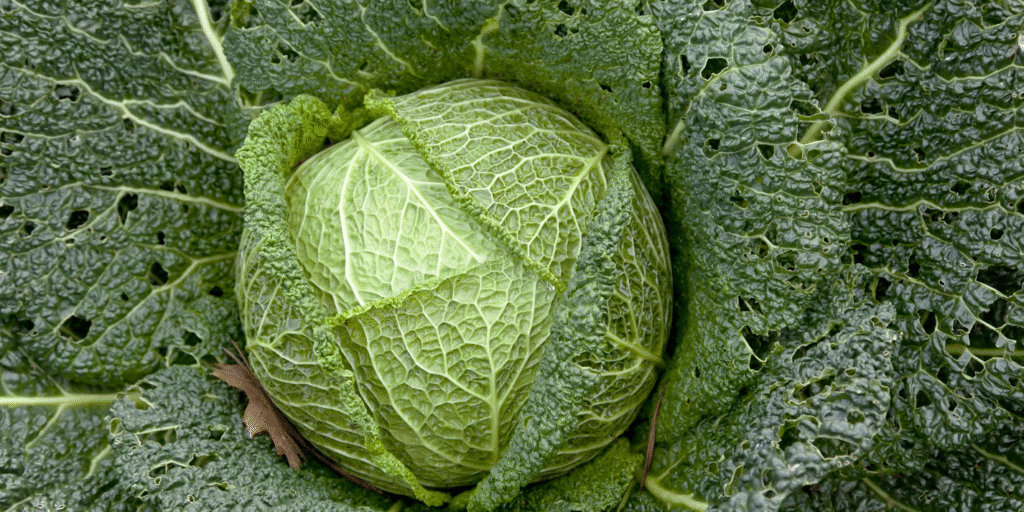Here’s a tip: Soaking cabbage in salted water for about 10–15 minutes before cooking can help reduce its goitrin content. Finely chopping or steaming it can also help neutralize its effects.
Still, it’s best to talk with your doctor or endocrinologist before making cabbage a regular part of your diet if your thyroid is already under strain.
2. People with Digestive Disorders: When Fiber Does More Harm Than Good
Cabbage is rich in fiber, which is typically a good thing—especially for regularity and gut health.
But for people with sensitive digestive systems, irritable bowel syndrome (IBS), chronic diarrhea, or frequent bloating, cabbage can act more like a trigger than a helper.
Its natural sugars and high fiber content can lead to gas, cramping, and discomfort. For seniors already dealing with slower digestion or a finicky stomach, that’s a recipe for distress.
If this sounds like you, gentler vegetables like steamed carrots, peeled zucchini, or mashed sweet potatoes might be better options. They’re softer on the system and still give you essential vitamins without the upset.
3. People with Histamine Sensitivities or Eye Allergies
This one may come as a surprise: Cabbage, especially when fermented or pickled (think sauerkraut or kimchi), can provoke allergic reactions in sensitive individuals.
That’s because cabbage naturally contains histamines—compounds that can trigger responses like itching, sneezing, watery eyes, or in some rare cases, even eye bleeding (known as subconjunctival hemorrhaging) in extremely sensitive people.
If you’ve ever had seasonal allergies, unexplained eye irritation, or food sensitivities, cabbage could quietly be contributing to the problem.
Symptoms might not show up right away but can worsen with regular exposure, especially to fermented cabbage products.
If you’ve experienced odd allergy symptoms after meals, it may be worth tracking whether cabbage or sauerkraut is involved—and asking your doctor about histamine intolerance.
4. People with Kidney Problems: Why Oxalic Acid Is a Concern
Cabbage might look low-risk, but it contains oxalic acid—a naturally occurring substance that can bind to minerals like calcium and lead to the formation of kidney stones.
If you’ve had a kidney stone in the past, or if you’re living with chronic kidney disease or reduced kidney function, oxalates are best approached with caution.
While one serving of cabbage now and then probably won’t cause harm, frequent consumption or large portions can increase your risk—especially if you’re not drinking enough fluids or are on a special renal diet.
What can help?
Cooking cabbage thoroughly and chopping it into small pieces can reduce the oxalate load, making it safer to enjoy occasionally. But as always, it’s smart to consult your nephrologist or dietitian before adding cabbage to your weekly menu.
How to Enjoy Cabbage Safely, If You Still Love It

If cabbage has been a beloved part of your meals for decades, you don’t necessarily have to give it up entirely.
Here are a few senior-friendly tips to enjoy it safely:
- Always cook it well. Steaming or boiling cabbage can break down some of the problematic compounds like goitrin and oxalates.
- Soak before use. A simple soak in salted water (10–15 minutes) can neutralize some of the thyroid-affecting compounds.
- Watch your portions. Moderation is key, especially if you have a health condition. Think of cabbage as an occasional treat, not a daily staple.
- Try gentler varieties. Napa cabbage or Savoy cabbage are often easier on digestion than green or red cabbage.
- Balance your plate. Pair cabbage with easily digestible proteins, heart-healthy fats, and low-oxalate vegetables to offset any potential risks.
Listen to Your Body and Stay Informed
There’s no denying it—cabbage is a nutritional powerhouse that offers a lot for very little money. But as with many healthy foods, one size doesn’t fit all—especially as we age.
If you’ve got thyroid problems, kidney disease, digestive troubles, or allergies, cabbage may not be your best friend. That doesn’t make it bad. It just means you need to be mindful.
Health after 60 is about finding the balance between nourishment and comfort, tradition and transformation. You don’t have to sacrifice the foods you love—but you do have to listen to what your body needs.
And sometimes, the kindest thing we can do is adapt. Even if it means trading cabbage soup for something gentler—your health is always worth it.





